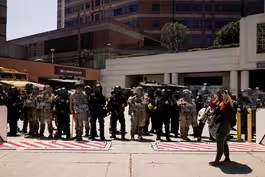
Ex-CDC director reacts to firing of vaccine advisory panel
Clip: 6/10/2025 | 7m 23sVideo has Closed Captions
Former CDC director reacts to RFK Jr.'s firing of entire vaccine advisory panel
The abrupt removal of all of the members of the CDC’s vaccine advisory panel by Health Secretary Robert F. Kennedy, Jr. has sparked outrage and worry among many public health experts. That includes the American Medical Association, which called for a Senate investigation into Kennedy today. Geoff Bennett has reaction from Dr. Tom Frieden, a former director of the CDC.
Problems playing video? | Closed Captioning Feedback
Problems playing video? | Closed Captioning Feedback
Major corporate funding for the PBS News Hour is provided by BDO, BNSF, Consumer Cellular, American Cruise Lines, and Raymond James. Funding for the PBS NewsHour Weekend is provided by...

Ex-CDC director reacts to firing of vaccine advisory panel
Clip: 6/10/2025 | 7m 23sVideo has Closed Captions
The abrupt removal of all of the members of the CDC’s vaccine advisory panel by Health Secretary Robert F. Kennedy, Jr. has sparked outrage and worry among many public health experts. That includes the American Medical Association, which called for a Senate investigation into Kennedy today. Geoff Bennett has reaction from Dr. Tom Frieden, a former director of the CDC.
Problems playing video? | Closed Captioning Feedback
How to Watch PBS News Hour
PBS News Hour is available to stream on pbs.org and the free PBS App, available on iPhone, Apple TV, Android TV, Android smartphones, Amazon Fire TV, Amazon Fire Tablet, Roku, Samsung Smart TV, and Vizio.
Providing Support for PBS.org
Learn Moreabout PBS online sponsorshipGEOFF BENNETT: The abrupt removal of all of the members of the CDC's vaccine advisory panel by the health secretary, Robert F. Kennedy Jr., has sparked outrage and worry among many public health experts.
That includes the American Medical Association, which called for a Senate investigation into Kennedy today.
Yesterday, Kennedy made his case in a column in The Wall Street Journal, saying he was -- quote -- "prioritizing the restoration of public trust" and argued the committee has been plagued with persistent conflicts of interest.
For some reaction, we're joined now by Dr. Tom Frieden, president and CEO of the global health organization Resolve to Save Lives and a former director of the CDC.
Dr. Frieden, thank you for being with us.
So this Advisory Committee for Immunization Practices, I imagine most Americans didn't know it existed until RFK Jr. fired all of its members.
What does this committee do?
How does it work?
DR. THOMAS FRIEDEN, Former Director, Centers for Disease Control and Prevention: It's a really important committee and it's been a model for the world in transparent, fact-based, effective decision-making.
Every presentation is livestreamed.
Everything is available on the Internet.
When I was CDC director, we had people coming from all over the world to watch it.
And the claim that it is -- has conflicts of interest is simply wrong.
What the Department of Health and Human Services and CDC did was to post all reported possible conflicts of interest over the last 20 or so years on the Internet.
Of the current 17 members, one has a potential conflict of interest.
That individual is a distinguished professor of pediatric infectious diseases.
And, as is the policy, she recused herself from all issues which she may have had a conflict of interest from.
Her conflict of interest was that she's a researcher who studied vaccines.
What's really important about this committee is that it gives guidance for doctors to know what to recommend to parents, what to recommend to seniors for what vaccines to get, and it determines whether insurance companies and what's called the Vaccines for Children Program will pay for vaccines.
So this decision means that potentially we will have recommendations that aren't based in fact that result in more spread of disease, and people will have to pay hundreds of dollars that today they don't have to pay a penny for.
GEOFF BENNETT: When Secretary Kennedy talks of conflicts of interest, he seems to suggest that the committee members, the former committee members, have a pro-industry orthodoxy that effectively acts as a rubber stamp, to which you would say what?
DR. THOMAS FRIEDEN: There are many instances where the committee has decided not to recommend a vaccine.
Just last year, a new vaccine, the RSV, which is for older people, new vaccine, important vaccine, bad illness, but, as more people get vaccination, you can see some possible what are called safety signals.
So there was a possibility, not proven, but a possibility that there may be a rare adverse effect.
There's really no way to know this until millions of people get the vaccination.
And, therefore, the committee restricted or limited the groups that are recommended to get the vaccine.
So this is simply untrue.
GEOFF BENNETT: How might this affect routine immunizations and the ability of insurance to cover them?
DR. THOMAS FRIEDEN: We're already seeing a decreased immunization rate.And when Secretary Kennedy says he wants to restore trust, the fact is that his activities over many years have been one of the main reasons there are questions about vaccines.
The reality is that, if there are lower vaccination rates, we will have more trouble controlling measles, which was eliminated in this country in the year 2000.
And we're now having more cases and more deaths than we have had in many years, and whooping cough, which is increasing.
The real concern here is that we're undermining, Secretary Kennedy is undermining and stopping a process that has been transparent, effective, and fact-based, and replacing it with we don't know what, but based on untrue statements, misinformation, and, frankly, fringe beliefs.
GEOFF BENNETT: Well, put this move into the wider context of other actions Secretary Kennedy has taken.
DR. THOMAS FRIEDEN: Well, we see on the one hand some of the things he's saying make a lot of sense initially, but then the next step is very unclear.
So he says, for example, that he wants to address chronic diseases, but then he eliminates the program at the CDC and cuts the program at the FDA that addressed tobacco control, which is the number one cause of chronic disease in the U.S.
He says that he wants to restore trust, and then he destroys or dismisses one of the most effective and trusted entities that has rigorously reviewed the facts and the science on vaccines.
It's clear that Secretary Kennedy has longstanding concerns about and beliefs about vaccines.
Those beliefs often are at odds with the facts.
And I'm afraid that that may well be what soon sets federal policy and determines who can get vaccinated and who can get reimbursed for getting vaccinated and who has to pay for their vaccines.
GEOFF BENNETT: Yes.
On this larger issue of Americans who might be hesitant to trust public health information coming from the Trump administration moving forward, what credible alternative sources can Americans turn to?
DR. THOMAS FRIEDEN: The American Academy of Pediatrics is a very strong organization.
They're pediatricians.
In fact, they were part of the Advisory Committee on Immunization Practices that just got disbanded.
I think one of the things that we do have to address is, there are concerns.
Some of those concerns are always with vaccines.
Ever since vaccines were discovered, there have been concerns about them because you're giving something that's an injection usually to people who are healthy.
And so you want to make sure that it's really safe and really effective.
One of the things that does undermine trust is the very high price and the very large profits that the pharmaceutical companies are making from vaccines.
And, ironically, a lot of those vaccines were created with taxpayer dollars, with research that taxpayers funded, and then the companies are making really profiteering level profits, billions or tens of billions of dollars, from that.
And I think that does cause justifiable concern, outrage, and questions about whether decisions are being made effectively.
But this is the wrong place to try to fix them.
The ACIP was a bulwark against the inappropriate influence of some pharmaceutical industry.
And, instead, we have very idiosyncratic beliefs, inaccurate statements being made.
And I really worry about what advice doctors will be able to get from the federal government and be able to give to their patients so we can all protect ourselves and our families.
GEOFF BENNETT: Dr. Tom Frieden, president and CEO of Resolve to Save Lives, thanks again for being with us this evening.
DR. THOMAS FRIEDEN: Thank you.
The costly journey Indian migrants face to reach the U.S.
Video has Closed Captions
Clip: 6/10/2025 | 9m 23s | The risky and costly journey Indian migrants face to reach the U.S. (9m 23s)
Daughter of American on the search for his remains in Syria
Video has Closed Captions
Clip: 6/10/2025 | 6m 10s | Daughter of American killed in Syria describes the fight to find his remains (6m 10s)
News Wrap: Gunman kills 10 at school in Austria
Video has Closed Captions
Clip: 6/10/2025 | 5m 45s | News Wrap: Gunman kills 10 at school in Austria (5m 45s)
Retired military leaders analyze deployment in LA
Video has Closed Captions
Clip: 6/10/2025 | 8m 20s | Retired military leaders analyze Trump's deployment of Marines and National Guard in LA (8m 20s)
Smithsonian board rejects Trump's attempt to fire top leader
Video has Closed Captions
Clip: 6/10/2025 | 6m 45s | Smithsonian board rejects Trump's attempt to fire top leader (6m 45s)
Troops deployed in LA as immigration raids stir protests
Video has Closed Captions
Clip: 6/10/2025 | 8m 41s | Troops deployed in LA as immigration raids stir fear and protests (8m 41s)
Providing Support for PBS.org
Learn Moreabout PBS online sponsorshipSupport for PBS provided by:
Major corporate funding for the PBS News Hour is provided by BDO, BNSF, Consumer Cellular, American Cruise Lines, and Raymond James. Funding for the PBS NewsHour Weekend is provided by...

















